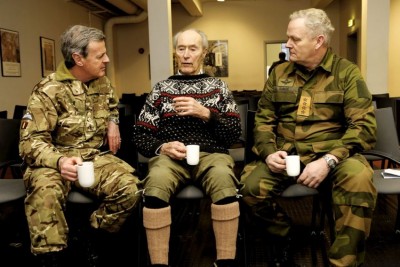UPDATED: Joachim Rønneberg was the last surviving member of the group of Norwegian resistance fighters during World War II whose daring sabotage action in Telemark helped prevent Nazi Germany from developing an atomic bomb. Rønneberg died during the weekend, 99 years old, and he’ll be honoured with a state funeral.

“Rønneberg was one of the great heroes in Norwegian war history,” Prime Minister Erna Solberg told state broadcaster NRK on Sunday. “We will remember him as an important part of the resistance movement in Norway.”
Rønneberg led the sabotage effort against the Norsk Hydro plant at Vemork in Telemark that had been taken over by Nazi German occupiers. After being sent supplies and trained team members from the UK, dropped by parachute in February 1943 onto the snow-covered Hardanger mountain plateau from aircraft that infiltrated enemy-occupied territory, Rønneberg guided the group over frozen terrain, down steep mountainsides, over a frozen river and up again to the plant nestled deep in a Telemark valley. Armed with explosives, they caused heavy damage to the plant and managed to escape as well.
Their heroic actions have been hailed over the years and became the subject of several books and films including the classic Heroes of Telemark starring Kirk Douglas. Rønneberg himself, though, generally tried to avoid the limelight and never liked being called a hero. “We were just doing a job,” he was fond of saying.
RELATED: War hero hailed as NATO flexes muscle
Rønneberg, already an accomplished skier and outdoorsman from the coastal city of Ålesund, was a member of the legendary resistance force known as Kompani Linge from 1941 to 1945. The sabotage action his group carried out is considered one of the most important during the war years but Rønneberg didn’t talk about it much for three decades. He moved back to Ålesund after the war and worked as a journalist and editor at NRK’s regional office in the county of Møre og Romsdal until 1987.
It wasn’t until the mid-1970s that Rønneberg realized he should pass on what he’d experienced during the war. “I realized that folks had a right to learn and get some answers,” he told NRK at the time. “It’s important we all understand what happened, so that it will easier to make the right decisions in the future. Those growing up today must understand that we must always be willing to fight for freedom and peace.”
Rønneberg was awarded Norway’s highest military honours, and received recognition abroad as well. He was being hailed on Monday as “one of our very best” by Norway’s current defense chief, Haakon Bruun-Hanssen, also by Defense Minister Frank Bakke-Jensen: “Joachim was at the forefront and took up the fight for who we are and what we believe in.”
Rønneberg’s family announced on Tuesday that his funeral will be held at noon on October 30, at the Borgund Church in Ålesund that dates back to the 1200s. The prime minister’s office also announced that all funeral expenses will be covered by the state, as another sign of Norway’s gratitude for the resistance effort Rønneberg led.
newsinenglish.no/Nina Berglund

